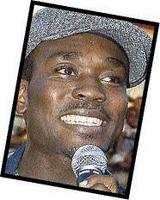Andre Jebbinson, Staff Reporter 

Moses (left) and Prodigal (right)
Many gospel artistes sing of their great change since being born again and the felonious lives they lived while they were outcasts. "Amazing grace, how sweet the sound" is no longer the testimony of dancehall gospel artistes, and lines such as "pop off di word" are becoming more popular.
Some gospel artistes are increasingly making reference to their former use of guns and it has puzzled many as to why they dwell on the negatives.
One of the most famous testimonies coming from dancehall gospel acts has to do with their days as notorious gunmen and the process leading to the blessed day when they were led out of delinquency and into a prosperous life of being a Christian and a decent citizen.
"People love to hear and see that there are transformed people. You don't just get up and walk away from the girl, the drugs and the gun. My testimony also helps me. It reminds me where God took me from and I am not going to stop telling it," said Kassim 'Moses' Grant.
Familiar story
His story is one of the most familiar ones. He lived in one of Jamaica's most violent communities where his father, now deceased, was a gang leader. Some of these genes were passed on to Moses. After a at a community dance, Moses was attacked at his home later that night, when gunmen from an adjacent community shot him three times. One bullet went to his head, another to his stomach and the last in his buttocks. He lived totell the tale, but that was a wake-up call.
How, then, and why should he keep this testimony to himself, Moses wonders.
"You listen to the story of Matthew, Mark, Luke and John, but you are not going to go to the preacher and ask why he is preaching it all the time. Whenever I share my testimony I do it with the hope that it will help one person that is going through what I went through. The testimony is not for everybody," Moses said. "I am sent on a mission with the authority that God has given me and people respond."
Many contend that charismatic churches often appeal to the emotions of the congregants, which causes them to 'get in the spirit'. In other words, it is coerced. The same is being said about dancehall gospel artistes. The aura is usually very different once the artiste begins to speak about his former follies. The audience sometimes pours out the reflexive tear, contagious shouts of hallelujah and other physical gestures. But, coerced or not, the mission of saving a soul has been accomplished, the artistes say.
"I try to tell people this is not the way to go and persons who are living like that that there is hope. It doesn't mean every time I go on stage I should talk about it. You get new testimony every day. Some people overdo it, but it is based on their conviction," said Calvin 'Prodigal' Whilby, who is also known to testify of his former dealings with the gun.
Souls saved
But appealing to the emotions is not at all an approach that either man would not rely on. At the end of the day, another soul would have been saved from damnation and it does not matter if the decision was made based on emotions or conviction.
"That is what makes you a good minister. You share, a man can give his life to the Lord. You can't stop people from giving over to emotions. Even if the people are saved by emotions, you can only pray that they will stay under the presence of God. God is not going to turn them away," Moses said.
Their method has worked, according to Prodigal and Moses.
"I have been all over the world to perform and I have seen people bring guns to th Prodigal recalled.
Also, Moses was featured on the popular television entertainment programme, 'On Stage'. Moses' compelling story grabbed the nation, which resulted in an encore presentation the following week. He also said some of those he kept company with have been affected by his testimony. He still tries to minister to those who have not found the way out as yet.
The only catch is "you have to live di testimony, otherwise it would only be a good story", Prodigal said.

